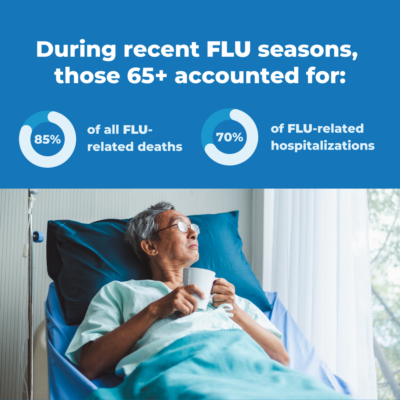
Older Adults and the Flu: What You Need to Know

Every year, otherwise healthy individuals of all ages suffer complications from the flu, resulting in hospitalization and even death. While everyone is susceptible to flu regardless of age or health status, it is especially dangerous for certain groups – including adults ages 65 and older. Seniors tend to bear the greatest burden of severe flu disease during most flu seasons. With this group being vulnerable and the CDC reporting that influenza activity is on the rise, it’s essential for seniors to receive an annual flu vaccine, as it’s the best preventative measure they can take to protect themselves from the flu.
By 2060, older adults will make up nearly 25 percent of the U.S. population, per the CDC. And while yes, today’s seniors are healthier than ever, they are still susceptible to the risk of getting a chronic disease, and immunity naturally decreases as we age. This puts them at a greater risk of contracting the flu and developing serious complications that may impact their immediate and long-term health.
During recent flu seasons, those 65 and older accounted for 85 percent of all flu-related deaths and 70 percent of flu-related hospitalizations. Even after recovering from the flu, seniors remain at an increased risk of heart attack, stroke, or other health disabilities. And for those who already have a chronic health condition, the flu can pose a more severe risk.
The good news is that getting a flu vaccine for this older population has many benefits. The flu vaccine not only reduces the number of flu illnesses among seniors, but studies have shown that it also reduces the likelihood of more severe flu outcomes like ICU admissions and length of stay, the overall duration of hospitalization stay, and flu-related death.
This flu season, three flu vaccines are preferentially recommended for people 65 years and older, according to the CDC:
- Fluzone High-Dose Quadrivalent Vaccine
- Flublok Quadrivalent Recombinant Flu Vaccine
- Fluad Quadrivalent Adjuvanted Flu Vaccine
If none of these vaccines are available at the time of administration, people in this age group can get any other age-appropriate flu vaccine instead. It’s important to discuss your options with your healthcare provider or pharmacist to see what is best for you. But the most important thing is to get vaccinated!
It’s also important to note that those who care for individuals in this age group or are around them often should get vaccinated. We are potentially exposed to flu and other viruses every day – from going to the grocery store to a child bringing it home from school. The flu is highly contagious, so protecting yourself and those around you is crucial, including vulnerable seniors. Taking other preventative measures also help – such as wearing a mask around others, washing your hands frequently, not touching your nose, mouth, or eyes, coughing into a tissue or sleeve, and disinfecting surfaces often (don’t forget your phone!). And, if you are experiencing symptoms to, make sure you get tested. Flu symptoms can look like many other illnesses, and testing is the only way to know for certain. With a tripledemic expected this winter (respiratory syncytial virus (RSV), influenza, and COVID), testing is the only way to know for sure and allows your healthcare provider to give you the best treatment.
Let’s protect our most vulnerable with a simple step that may prevent hospitalizations or even death. Get your flu vaccine this flu season, and encourage your family and friends to do the same.


